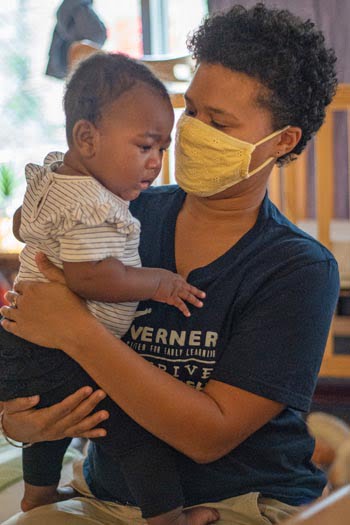Caring for the Caregivers
Verner is a nonprofit providing high quality, affordable early care and education to children from birth to five years old.

Mental Wellness and Teachers
Foundations of Community
“Community.” We hear that word a lot. We want our communities to thrive, we want to build strong, healthy, and vibrant communities. But what does that really look like?
It begins with recognizing that community emerges from individual people (just as a forest is really a collection of individual trees). We must also acknowledge that every person is a product of the environment, family, and circumstances in which they have lived—each of us is the result of a lifetime of experiences that starts the moment we are born.
During the first few years, especially from birth to age three, infants and toddlers accomplish amazing feats of cognitive, social, emotional, and motor development, with the brain changing more rapidly than at any other time in our lives (no, they are not just sleeping, eating, and drooling!). Research shows that this early development profoundly shapes the years that follow, laying the foundation for outcomes in school and adulthood. Research also shows that the quality of this development is tied directly to the quality of care the child experiences. In other words, building healthy, vibrant communities starts with creating environments in which children thrive.
Today, children spend more time in group care than at any other period in history, a shift that reflects societal changes that have affected how we work, our access to resources, and ever-changing expectations of “family.” The reality that many children, as early as six weeks old, spend up to 50 hours per week in care outside the home places an extraordinary responsibility on our teachers and caregivers.
Teachers are responsible for children’s safety and health, a responsibility that requires complete attention during every second in the classroom. But the role of an early childhood educator is so much more than “babysitting”—teachers create intentional learning environments, engage and respond to individual children, and facilitate children’s cognitive, motor, and social-emotional development during the years that fundamentally shape the adults they will become. In other words, teachers, in partnership with the families they serve, are building the very foundation of our community.
Early Childhood Teachers
An early childhood teacher’s job is incredibly demanding. Although politicians and greeting cards occasionally praise educators as “heroes,” teachers—especially those in early childhood settings—typically receive low pay and minimal benefits. The reasons our society undervalues teachers are many: misplaced social priorities, lack of understanding of child development, entrenched inequality, and so on. Additionally, early childhood teachers are most often women, and therefore subject to society’s repulsive pattern of undervaluing “women’s work” and setting aside “unimportant work” for women. This disregard for the importance of educators is amplified for BIPOC teachers, who routinely receive lower pay than others in the same field, aggravating historic and ongoing inequities in our communities.
This reality of a highly demanding job with massive responsibilities but often inadequate support and resources can create a cycle of challenges and stressors for teachers that impacts our entire community. If we truly want to build strong, vibrant communities, we must support our teachers.
Supporting Teachers
Supporting early childhood educators is an issue of ethics and equity—teachers deserve recognition, respect, pay, and benefits that match their value and expertise—but it is also a practical matter: there is no question that our jobs, our economy, and our communities depend on the work of our teachers. If we entrust the care of our children to others, we must provide the resources and working environment for them to be their best.
One way to support teachers is by recognizing the importance of mental wellness. The work environment for early childhood teachers is, to put it mildly, bananas. Teachers must attend to the health and safety of groups of children while also implementing developmentally appropriate practices (e.g., what might look like “just playing with babies” actually involves very intentional activities that facilitate complex learning) while supporting children’s “big feelings” and also managing seemingly endless snacks, diapers, drop-offs, clean-ups, etc. It is hard work that requires infinite patience and calm, which is possible only if mental wellness is maintained. In short, good teachers are well teachers.
We all face stress in our lives, and the past few years have amplified most of our worries about health, security, identity, and home. The pressure on teachers has been especially intense and, when combined with a stressful work environment and generally low support, can create real challenges to mental wellbeing. This matters because the mental health of our teachers affects how they do their jobs—and therefore the success of our children.
Additionally, unchecked stress leads to burnout and high turnover in our schools and childcare centers, which can weaken relationships between centers and the families they serve and destabilize the role of early education in our communities. For everyone’s sake, the mental health of teachers must be supported in ways that are real, meaningful, and consistent.
Mental Wellness at Work
What does it mean to “support mental health” in the workplace? Strengthening wellbeing starts by building an environment and culture that values people. Supporting wellness is not a single event or a checklist but rather an ongoing, comprehensive, person-centered approach to work.
Creating a culture of care is neither simple nor free, but it is within reach for any organization and, importantly, results in a more stable, efficient, and productive workplace. At Verner Center for Early Learning, we are committed to caring for the caregivers and have experienced the difference this makes.
Verner is a nonprofit providing high quality, affordable early care and education to children from birth to five years old in Buncombe County through center- and home-based programs. We are dedicated to building a community where every child and family has the opportunity to thrive. To do this, we provide children and families the best possible learning environments and ensure our teachers are valued and supported.
At Verner, supporting teachers’ mental wellness takes many forms:
Creating a Culture of Care
Supporting wellness in the workplace begins by building meaningful relationships in which staff are truly “seen and heard.” This means acknowledging teachers as individuals, listening to them, knowing them, and truly connecting. At Verner, every person contributes to the tone of our centers with their words, actions, and willingness to support one another. But the tone is set by the directors who, in every conversation, directive, and response, aim to remind teachers they are valued and respected. We also provide weekly reflective supervision in which teachers discuss their work, share challenges and successes, and receive strength-based guidance on working with children and families.
Naimah “Nemo” Coleman is finishing her first year teaching at Verner. “When I started here, I was excited to work with kids and connect with families, but I was nervous because of the hefty load of baggage I carry from years of trauma, hopelessness, mental health challenges, and lack of support. At Verner, I found a place that actually cares about me and considers what I need, and where people really want to uplift one another. It’s refreshing, especially coming from a toxic work environment where you’re burnt out, feel unseen, and spend breaks crying in the bathroom.”
Providing Wellness Resources
Schools and childcare centers should also provide specific, actionable resources to support health and remind teachers their wellness is important. Verner aims to build an environment of care with basic things, like having an intentionally-designed space to take a break, where teachers grab a quick moment to “reset,” enjoy their lunch, stretch in the yoga space, or otherwise find their calm before returning to a classroom full of infants and toddlers. We also have weekly personal trainer sessions for staff to work on physical wellness goals.
Verner offers on-site wellness chats with a licensed clinical mental health counselor (MC Ellis from MC Counseling and Consulting), gives teachers the time to use this resource, and connects staff to outside support resources when they are needed.
Nemo recalls, on a day “I felt completely lost and hopeless, our clinical director sat with me in her office and helped me reach out to five therapists. She took the time to listen and supported me while I made the calls. I felt like I mattered and that Verner cared about me as a person, not just the work I do.”
Even without an identified, immediate need, teachers should know that help is available. The organization cultivates mental health awareness through trainings on managing stress and building resiliency and offers a directory of outside resources, help centers, and providers, as well as help navigating the process so as to empower teachers to identify and get the support they deserve.
Providing Other Resources
Supporting teachers means acknowledging the numerous factors that affect their personal and professional wellbeing. In addition to these mental and physical health resources, Verner might helps out with gas cards if a teacher is struggling getting to and from work, offer tuition assistance toward relevant graduate degrees, and provides ongoing professional development opportunities in the form of trainings, workshops, and attendance to conferences.
Nemo notes, “Because of the help and resources I’ve received through Verner, I am in a much better place than I was. I am more aware of my mental health, and I feel supported, seen, and hopeful. As my own wellness has improved, I am better equipped to give the effort and skills I always knew I had but sometimes got lost in all the noise. When I feel seen, safe, and cared for, I can give the children all the love and learning they deserve. I like to say that, when the sun shines, I shine. And when I shine, my children sparkle.”
We all want a strong community. Let’s build it together—one child, one family, and one teacher at a time.
For more information about Verner Early Learning Center, visit www.vernerearlylearning.org.







